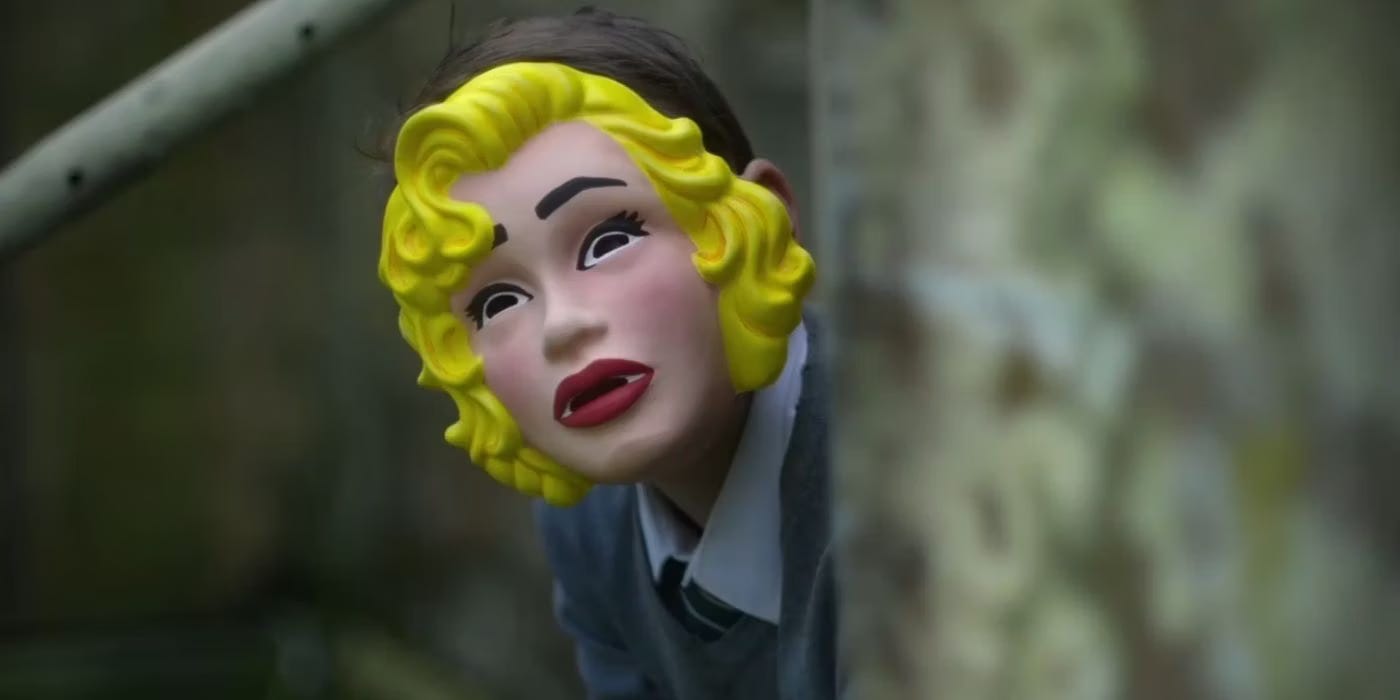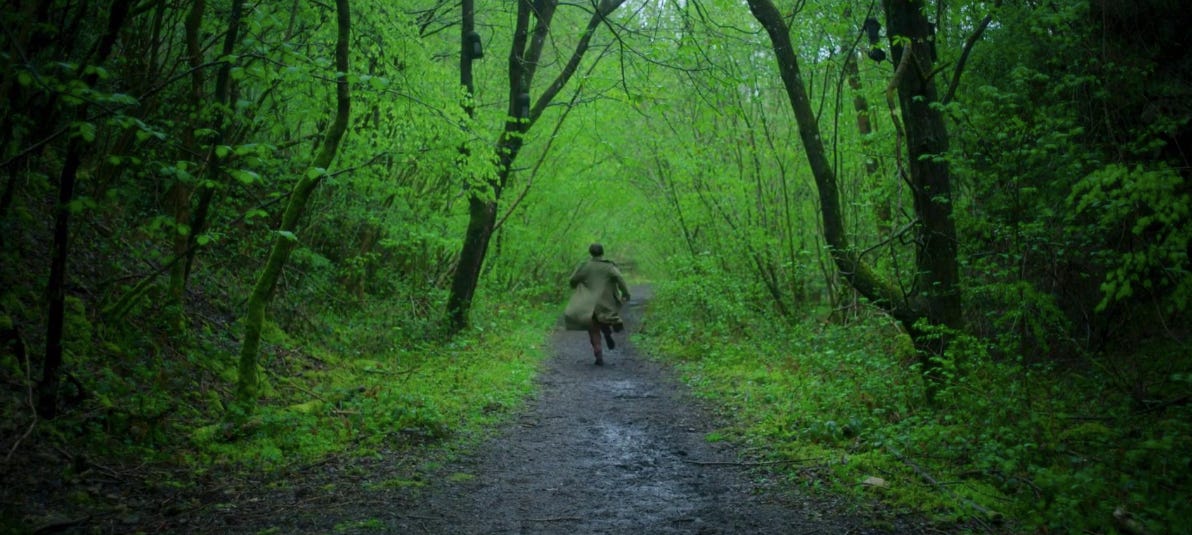Identifying, Or Not, With *Men*
Alex Garland’s film is best understood as a rape/revenge film
Alex Garland’s 2022 film Men is a rape/revenge film which spends most of its run time trying to distance itself from rape/revenge films. It seems to have worked; most critics haven’t noticed or appreciated its genre precedents, which is perhaps why the movie has been met with a certain degree of bafflement. Once the context is clearer, the movie’s achievements become easier to identify, as do some of its failures.
Men starts (as many a rape/revenge film does) with our protagonist, London profesional Harper Marlowe (Jessie Buckley), traveling to the scenic countryside of Cotson, Herefordshire to recuperate. We slowly learn that her husband James (Paapa Essiedu) died or killed himself following their separation. She’s trying to get over her grief and guilt.
Unfortunately, Cotson turns out to be anything but restful; after Harper takes a (gorgeously shot) scenic walk through an echoing tunnel, she is followed and terrorized by a naked man (Rory Kinnear.) Then she’s cursed at by a boy Samuel (also Kinnear), and insulted by a vicar (yep, Kinnear again.)
By this time, she’s ready to head home…but of course it’s too late for that. She’s besieged in the house by multiple Kinnears, culminating in a stunning, dreamlike sequence in which each Kinnear gives bloody, improbable birth to the next, across the garden, into the house, and eventually onto her couch, where her dead husband, the final afterbirth, asks her to love him.
___
If I were going to paywall this, I would do it here. But! I’d much rather let everyone read the whole thing. So, if you go on to read the whole thing, consider becoming a paid subscriber so I can keep writing and sharing content with everyone.
____
Identifying with the marginalized, of various genders
Critics have mostly linked this queasy, surreal narrative of gendered violence to British folk horror. The real predecessors, though, are, as I said, rape/revenge films such as Deliverance, I Spit On Your Grave, Straw Dogs, and related slashers like Texas Chainsaw Massacre and The Hills Have Eyes.
Like Men, these movies all tend to focus on gender-based violence and oppression and on class-based tensions between urban and rural. Generally the targeted woman is also a professional, or from a more urban milieu; she becomes a symbol of upper-class decadence, and the attack on her is framed as a kind of resistance to exploitation, even as her ultimate reversal of violence (often via literal castration of her attackers) is framed as resistance to patriarchy.
As Carol Clover discusses in her seminal study Men, Women, and Chainsaws rape/revenge is not just a single swing of the scythe; it’s a repetitive motion, in which each arc is both violence and revenge for violence. She deserves it, and then he deserves it, and then…back and forth, over and over. The genre’s power is in the way it encourages viewers to revel in violence against everyone, and to identify with multiple oppressed victims (though sometimes to varying degrees.)
You can see this particularly in Deliverance, which is something of an ur-text of the genre. In that movie, the victim of the rape is a man, and the horror of that rape (especially for an audience drawn in for a male adventure narrative) is that the man is put into the position of a woman. He is emasculated, as are the poor rural people whose land is going to be flooded by big corporations and governments they cannot control.
Men and women and art films
With that background, some of Garland’s choices in the film become somewhat clearer, or at least take on resonance. Harper’s (physically and emotionally) abusive husband is Black in part, I think, because, again, the genre is built on a power dynamic of (relatively) upper class women/relatively marginalized men. James isn’t rural, but he is racialized.
The movie itself doesn’t seem to “see” color, but I think narratives about violent Black men and weaponized rape accusations are lurking in the movie’s margins. When the Vicar accuses Harper of James’ death because she refused to forgive him for hitting her, he's being a misogynist patriarchal asshole, and she’s right to tell him to fuck off. Per its genre, though, the movie also whispers about other power relationships, in which marginalized men are not necessarily always the ones holding the right end of the ax.
The compulsive cross-gender identification of rape/revenge films also clarifies Garland’s bizarre and much-discussed conclusion. The men giving birth to one another is a commentary on the way in which patriarchy perpetuates itself, as men crawl from their own stomachs and mouths and orifices in gouts of blood and rage, driven by hatred of women and their own self-loathing and patriarchal self-aspirations.
The sequence is also though about men identifying with or putting themselves into women, as aggressive appropriation (James and the Vicar both claim Harper is threatening them even as they threaten her) and as a commentary on the way that when marginalized men are targeted or threatened, they are often (especially in these films) framed as being in the position of women.
Harper actually slices one assailant’s arm, dividing his hand in a wound that is identified as a grotesque yonic symbol. Gender is attached to bodies, but it’s also a symbolic apportionment of the roles of victim and victimizer, which is why rape/revenge films and slashers—like, Deliverance or, say, Psycho—often feature villains whose sexual identity is queer or contested.
Cleaner genders
Having mentioned Psycho, it’s notable that (as Clover argues) highbrow, or upscale rape/revenge films are often more patriarchal and in many ways less condemnatory, and less angry about, patriarchal violence than their downscale kin. Psycho famously, and sadistically, murders its female protagonist halfway through. Films like Bergman’s Virgin Spring are focused on the father’s grief, rage, and guilt, rather than on his daughter’s experience and trauma.
Men mostly avoids this problem; it is beautifully shot and its high production values, stellar actors, and use of techniques like montage and dramatic abstruse imagery situate it firmly as an art film. It’s also, though, clearly Harper’s story throughout, and the movie is firmly on her side.
The upscale style, and the symbolism, do distance the film from scuzzier cousins in other ways. Though sexual violence is hinted at (especially in a scene with the Vicar in Harper’s bathroom), there is nothing like the painful, extensive depiction in Deliverance or I Spit On Your Grave. There is, as a result, little danger of viewers identifying with, or cheering on, rapists. The genre’s wild swings of queasy empathy are muted; you want Harper to gut her antagonists and escape. You aren’t encouraged, simultaneously or sequentially to root for the men to harm her, as many argue in the case in films like I Spit On Your Grave or Ms. 45.
The downside there, though, is that in refusing to fully explore the genre’s identification with its villains, the movie Men lets men off the hook. When every man is Kinnear, Kinnear is the only man implicated. Patriarchy is all-encompassing, but it’s also restricted to this one guy and this one village.
I Spit on Your Grave is a painful film in part because of the way it explores how men perform misogyny for each other, and how male patriarchal bonds—between the men onscreen, and between the men watching the screen—are forged through horrific violence. Deliverance is about how (perceived) emasculation justifies narratives of revenge and extermination. That’s especially disturbing and visceral because the film’s enaction of sexual violence is designed to emasculate male viewers by proxy and then turn revenge and adventure tropes back on themselves.
In comparison, Men—despite the bloody effects—feels clean and antiseptic, not just because it has higher production values, but because it treats men almost as another singular species with one face, rather than demanding viewers experience, or confront, their own investments in patriarchal hatred and violence. Garland’s film is a fascinating effort to use a difficult and complicated, conflictedly feminist genre in a unique way. It’s impressive, but I don’t think I would quite say this monstrous birth is the best, or most effective, of its kind.






I wrote briefly about Men on my Substack a few months ago. What struck me about all (but one) men being Kinnear is that people would have been enraged if it had been written by a woman. It would have been seen as simplistic - all men are the same - and it would have been that. But you're right, it does also let men off the hook.
While I appreciated the symbolism of the birth scene you mentioned while watching the movie, I also honestly guffawed because I think the purely body horror aspect of it is only going to be shocking to... men.
Hi, Noah, what did you think about the movie Promising Young Woman? I'm a bit of a film buff and like to see where my alignment is with critics so I know how to align their critiques with my tastes. I ask because Promising Young Woman is somewhat within this genre of which you're referencing.